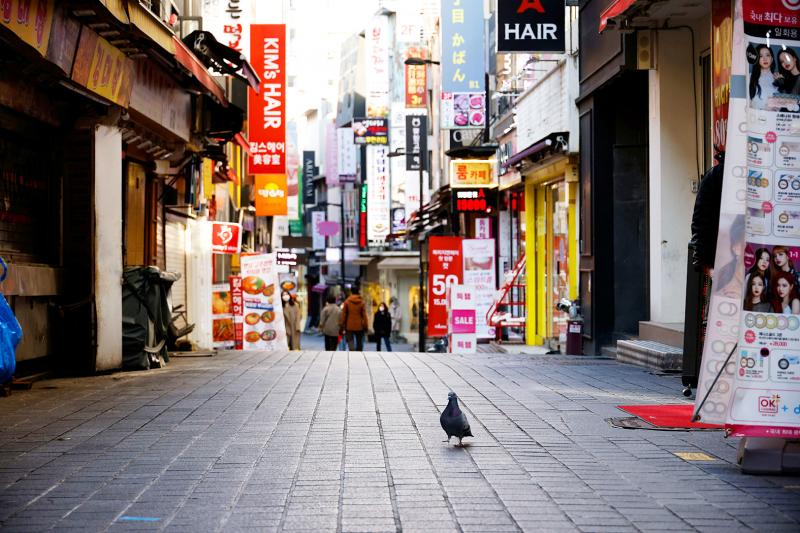A new round of social distancing rules yesterday took effect in the South Korean capital, Seoul, dealing a blow to small businesses, despite brighter hopes for economic recovery after earlier success in battling COVID-19.
The measures range from closures of nightclubs and karaoke bars and curbs on eating in cafes and restaurants to fewer nighttime public transit services and limits on religious services, weddings and funerals for the next two weeks.
“I feel like I am left alone in the dark,” said Jung Gong-dan, who runs a pub near the capital’s Itaewon District, saying she has lost hope after a ban on dining in restaurants after 9pm.

Photo: Reuters
The “emergency pause” in activity in the densely populated capital and surrounding areas aims to damp a resurgence in outbreaks in offices, schools and small gatherings that have combined to drive a third wave of infections.
Asia’s fourth-largest economy returned to growth in the third quarter, reversing its sharpest contraction in more than a decade, as the government pushed through stimulus measures, and major trading partners eased virus curbs.
The benchmark KOSPI hit its all-time high yesterday, for a dramatic gain of 83 percent from its low soon after the pandemic hit in late March, as authorities cut interest rates and poured money into the financial system.
However, the revival of financial asset prices has shown little spillover into the real economy, as owners of small businesses and street shops shut down in the face of the new restrictions.
“I’m planning to launch a takeout wine sale with discounts, which is the only way to head off a cash crunch, given revenue drops throughout the year,” said a wine bar owner, who runs two stores in downtown Seoul.
The owner, who asked to be identified only by her surname, Kim, said she had bought supplies worth 10 million won (US$9,011) in expectation of a surge in year-end reservations.
The usual bustling activity and long lines in many of Seoul’s shopping streets and nightlife areas was missing on Monday evening.
Without government help, it would almost be easier to shut permanently than try to stay open under the new curbs, after large losses incurred in the year’s earlier outbreaks, Jung said.
“I hope the government will provide practical measures to help us, because constantly suspending night operations virtually means no business,” she added.
The government has yet to propose a new round of stimulus measures, but yesterday the main opposition party called for billions of US dollars to be diverted from next year’s budget proposal as subsidies.
South Korean President Moon Jae-in apologized for having to restrengthen distancing measures, but said “there is no other path” to sever infection links and prevent greater hardship.
Health authorities have warned that the current wave of infections might be harder to limit than before, as most occurred in the wider general community around Seoul.
The Korea Disease Control and Prevention Agency reported 349 cases, as the daily tally ticked up again after a slight drop reflecting fewer weekend tests.

‘IN A DIFFERENT PLACE’: The envoy first visited Shanghai, where he attended a Chinese basketball playoff match, and is to meet top officials in Beijing tomorrow US Secretary of State Antony Blinken yesterday arrived in China on his second visit in a year as the US ramps up pressure on its rival over its support for Russia while also seeking to manage tensions with Beijing. The US diplomat tomorrow is to meet China’s top brass in Beijing, where he is also expected to plead for restraint as Taiwan inaugurates president-elect William Lai (賴清德), and to raise US concerns on Chinese trade practices. However, Blinken is also seeking to stabilize ties, with tensions between the world’s two largest economies easing since his previous visit in June last year. At the
Nearly half of China’s major cities are suffering “moderate to severe” levels of subsidence, putting millions of people at risk of flooding, especially as sea levels rise, according to a study of nationwide satellite data released yesterday. The authors of the paper, published by the journal Science, found that 45 percent of China’s urban land was sinking faster than 3mm per year, with 16 percent at more than 10mm per year, driven not only by declining water tables, but also the sheer weight of the built environment. With China’s urban population already in excess of 900 million people, “even a small portion

UNSETTLING IMAGES: The scene took place in front of TV crews covering the Trump trial, with a CNN anchor calling it an ‘emotional and unbelievably disturbing moment’ A man who doused himself in an accelerant and set himself on fire outside the courthouse where former US president Donald Trump is on trial has died, police said yesterday. The New York City Police Department (NYPD) said the man was declared dead by staff at an area hospital. The man was in Collect Pond Park at about 1:30pm on Friday when he took out pamphlets espousing conspiracy theories, tossed them around, then doused himself in an accelerant and set himself on fire, officials and witnesses said. A large number of police officers were nearby when it happened. Some officers and bystanders rushed

Beijing is continuing to commit genocide and crimes against humanity against Uyghurs and other Muslim minorities in its western Xinjiang province, U.S. Secretary of State Antony Blinken said in a report published on Monday, ahead of his planned visit to China this week. The State Department’s annual human rights report, which documents abuses recorded all over the world during the previous calendar year, repeated language from previous years on the treatment of Muslims in Xinjiang, but the publication raises the issue ahead of delicate talks, including on the war in Ukraine and global trade, between the top U.S. diplomat and Chinese